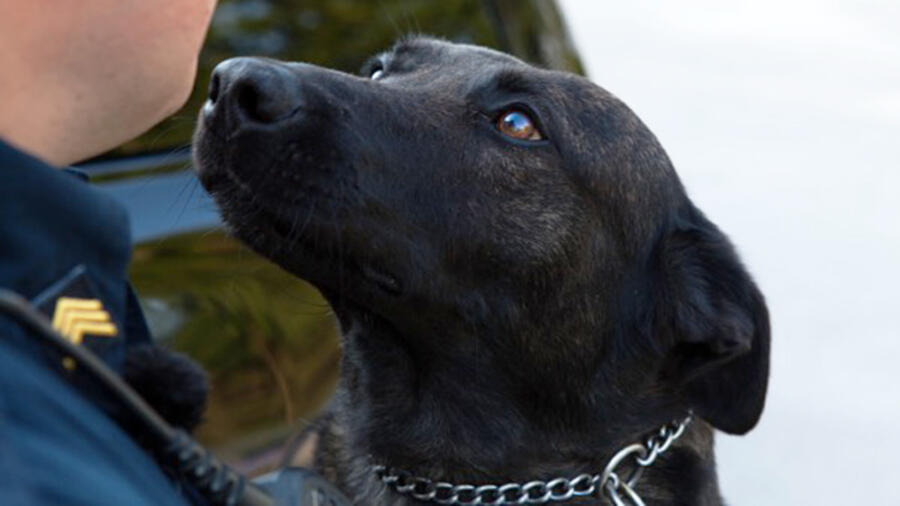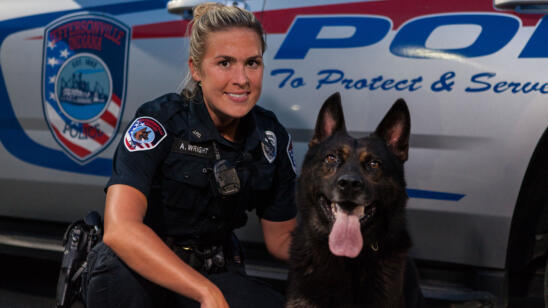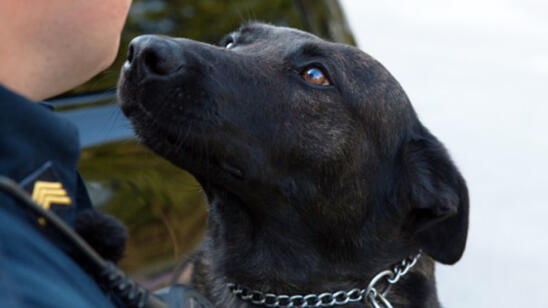Police Officer Sgt. Denver Leverett of the Jeffersonville (Indiana) Drug Investigation Unit and his K-9 partner Flex stop drivers for being under the influence and possessing illegal substances all the time. But Live PD fans have been particularly impressed with the relative ease with which he gets suspects to confess to their crimes. Some even call him a “human lie detector” or “mind bender.”
Most recently, fans were impressed by Leverett’s ability to get a man to admit he was hiding marijuana— in his buttocks, of all places.
A&E True Crime spoke to Leverett about how he gets people to tell the truth, the unexpected places he’s found drugs (butts, actually, aren’t that unusual) and what would surprise fans to know about Flex.
Is talking people into telling you the truth something you learn in the academy or something you gain with experience on the beat?
The focus on criminal indicators when dealing with the motoring public takes practice. But over my 17 years [in law enforcement], you develop your own system. I try to keep people talking. It’s a skill you have to learn. But if it’s a craft you enjoy and have a passion for, then you strive to perfect it.
When I’m on the side of the road, it’s not police-officer-to-citizen. It’s not having authority over them. I’m just talking person-to-person. I don’t come strong at them. I don’t belittle them or degrade them. I try to keep it personal, in the sense of being respectful and treating them fair. It’s all how you talk to people. When you talk to people as a person, versus an object, then they gain trust in you. It’s verbal judo.
Eventually criminals incriminate themselves. I think when you come strong at someone, you’re going to do one of two things: You’re going to shut them down or you’re going to have confrontation. That’s what I try to avoid.
We’ve heard from Live PD analyst Tom Morris, Jr. that just being polite when interacting with the police is to everyone’s benefit—it helps keep a tense situation from escalating. Has that been your experience?
There’s absolute truth to that. I think it works both ways [on the officer side and the civilian side].
The biggest thing we have in our career is police discretion. I have the ability to handle a situation numerous ways. A lot of it depends on somebody’s attitude, their cooperation, their honesty. If I can cut somebody a break, I’m going to do it, because I try to look at the big picture. If I can build a foundation with people and I gain that trust with somebody, they may help me in a situation down the road.
[When] kids are involved, my main priority is keeping a family together and not taking a father out of the household. I try to look at the big picture, not just live in the moment.
At the end of the day, it’s still a job that I have to do. Honesty and cooperation goes a long way, [but]
I never make anybody any promises. Every situation we deal with is fluid, and anything can happen at any given time, so I may have to take a different course of action.
On the PD Stories podcast, Sgt. Leverett discusses busts and experiences you haven’t seen, including the K9 partners he had prior to Flex.
What’s the weirdest place people hide drugs?
Many drug couriers use their genital area, both female and male. They know that, chances are, we can’t search that area. When I get somebody talking and they incriminate themselves verbally, then that furthers my probable cause on the searches of these areas.
The genital area is probably the most common area to carry their drugs, because they feel safer that way. They know if they leave it inside the car, they’re taking a chance on me finding it or my dog finding it.
[Sometimes] they’ll also carry it in their mouth under their tongue.
In places outside of human contact, we found drugs in dog-food bins. They’ll take dog food out of the bin, put drugs at the bottom and put dog food over it. They’ll hide it in kitty litter, under a dog house.
You have to think outside the box when you do these search warrants and these vehicle stops because you always have to be one step ahead of the drug dealer. They’re going to do anything they can to throw your dog off: They’ll use mustard, engine oil, dog food and human food.
How did you start working with the K-9 unit?
When I was a child, my uncle was the police chief so I was fortunate enough as a young boy to ride with the K-9 Unit and volunteer my time. That’s how I developed my passion. Once I was hired [as a police officer] in the beginning of 2001, one of our K-9 officers at the department died and they opened applications. I was the only one that applied, but I had less than two years on [the job] so I was ineligible. The chief and I sat down and he said, ‘I’ll consider you, but I need a commitment from you that if you get in, you’re not going to get out.’
I gave him my word 16 years ago and I’ve kept my word. I’m on my fourth K-9 now.
Does Flex live with you?
Yes, Flex lives with me. He’s a part of my family. Each of my four K-9s have lived with me. When he’s at my house, he’s a totally different dog. My 2-year-old son plays with him when I’m present. But when he comes to work, he flips the light switch and he’s all business.
So you’re allowed to treat him more like a pet during off time?
It’s kind of unspoken. When he’s at home, he’s just a dog, just a pet. But when he sees me through the glass door, starting to put on my uniform, he starts to run in circles. Because with repetition and conditioning, he knows every time I put the uniform on I bring him out and we go to work or we go to training. He learns through association and his mindset changes when we leave our house.
We know people shouldn’t pet service dogs in public, because they’re working. Is it the same for the K-9s? Are people on the street allowed to pet Flex?
Any service animal, or any animal in general, needs to gain a level of respect. Each animal has their own personality and own temperament. Whether I’m on duty or off duty, my K-9 is very social and anybody can pet him, but you need to respect him. If you come up to me and you ask me, then yes I’ll let you pet him.
He is capable of biting but he’s only going to bite somebody if he’s instructed to in a law-enforcement manner or if he’s protecting me. He can perceive a threat or non-threat, but it kind of just goes down the leash. By nature he’s very social. We do demos with kids, we’ll do it off-lead and the kids are allowed to pet him. At the same time, safety and respect are paramount when I’m handling him.
Live PD fans have commented on what a hard worker Flex is. What do you think of him as your partner?
As my partner, I’m blessed. A lot of it is genetic, his breed, his instincts, his instinctual drive that he was born with. He’s a very high-driven dog.
Part of the reason he is so good is that we’ve put in a lot of time as a team [training] during off-duty hours. In order to get something you have to work hard for it, and we both do. We’ve practiced a lot and we’ve earned everything that we’ve accomplished on the street.
Last season, Officer Alysa Wright from Jeffersonville spoke to us about taking down two suspects at once and choosing not to call out her K-9 from the car due to another dog being nearby. Are there times you’ve had to hold back Flex, for safety reasons?
Not only when other dogs are involved, but in any situation that you go to you have to base your course of action off the totality of the circumstances. We’re taking in a lot of different things: the seriousness of the crime, whether somebody’s actively resisting or not and the threat that they pose to society. We have to weigh these three options in each scenario in order to deploy our K-9.
Safety is the number-one concern, but when you speak of other pets, other dogs, deer, other animals, we train our dogs around these factors. We condition the K-9s not to be influenced [by other animals].
What happens to the K-9s once they retire? Do they continue living with their former partners or are they adopted out?
That’s mainly a decision that rests with the chief of police [since] the K-9 actually belongs to the police department. He is a tool. Fortunately our chief and our administration are kind enough to allow our K-9s to live with us when they retire. We don’t adopt them out, per se, because of the risk factor—they bite, so it’s a liability issue.
If I was to get out of the unit [my dog partner retires], our administration has the option to transfer that K-9 to a new handler.
What’s something about Flex that would surprise fans of this show to know?
One thing he does that drives me crazy is he hates moles, so my backyard looks like the worst in the neighborhood—I have holes all over my yard. He’s the living, breathing mole exterminator. I always have to go get more topsoil, more grass seed, more straw, more fencing.
Also, how docile he is with my 2-year-old. He’ll lick his face and allow him to pull on him, tug on him. That is kind of unique because in an instant, he’s there to protect me and he would apprehend anybody in a very physical manner. He has abilities to go both extremes on his temperament.
What do you like to do for fun when you are off duty?
I would say my two biggest hobbies are Crossfit to relieve stress and—I have an odd hobby—I’m big into salt-water aquariums. I’m called a “reef junkie.” I have a big salt-water aquarium in my house with different coral. That’s how I relax at the end of the day. I watch it and decompress.
For more stories from Sgt. Leverett, listen to an interview with him in Episode 6 of the PD Stories podcast. For more information, visit the PD Stories page.
Related Features:
Live PD’s Dep. Addy Perez on Transitioning from the Military to Law Enforcement
Lt. Glenn Jackson on Training ‘Live PD’ K-9s Flex and Cairo
Live PD’s Officer Alyssa Wright on Taking Down Suspects—Two at a Time


